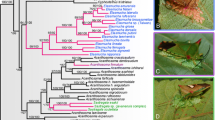Abstract
We describe the first record of amphisexual care in an insect with uniparental male care. Male Rhynocoris tristis are noted for aggressively guarding multiple egg masses. When a male is unable or unwilling to guard eggs, a female that has previously contributed eggs returns to the egg mass and defends it until the eggs hatch. We compared the frequency and intensity of parental aggression in both sexes and found no difference in either form of guarding behavior. Evidence of amphisexual care in R. tristis provides an opportunity to quantify the cost of care in both sexes within a single species.
Similar content being viewed by others
References
Balshine-Earn S, Earn DJD (1997) An evolutionary model of parental care in St. Peter’s fish. J Theor Biol 184:423–431
Bourne GR (1998) Amphisexual parental behavior of a terrestrial breeding frog Eleutherodactylus johnstonei in Guyana. Behav Ecol 9:1–7
Dawkins R, Carlisle TR (1976) Parental investment, mate desertion and a fallacy. Nature 262:131–133
Gross MR, Sargent RC (1985) The evolution of male and female parental care in fishes. Am Zool 25:807–822
Kaitala A, Mappes J (1992) Evolution of parental care in insects. Luonnon Tutkija 96:158–162
Machado G, Oliveira PS (1998) Reproductive biology of the neotropical harvestman (Goniosoma longipes) (Arachnida, Opiliones: Gonyleptidae): mating and oviposition behaviour, brood mortality, and parental care. J Zool 246:359–367
Manica A, Johnstone RA (2004) The evolution of paternal care with overlapping broods. Am Nat 164:517–530
Maynard Smith J (1977) Parental investment: a prospective analysis. Anim Behav 25:1–9
Odhiambo TR (1959) An account of parental care in Rhinocoris albopilosus Signoret (Hemiptera-Heteroptera: Reduviidae), with notes on life history. Proc R Entomol Soc London Ser A 34:175–185
Queller DC (1997) Why do females care more than males? Proc R Soc Biol Sci B 264:1555–1557
Ridley M (1978) Paternal care. Anim Behav 26:904–932
Tallamy DW (2001) Evolution of exclusive paternal care in arthropods. Ann Rev Entomol 46:139–165
Tallamy DW, Wood TK (1986) Convergence patterns in subsocial insects. Ann Rev Entomol 31:369–390
Thomas L (1994) The evolution of parental care in assassin bugs. PhD Thesis, University of Cambridge, Queens College, Cambridge, UK
Thomas LK, Manica A (2003) Filial cannibalism in an assassin bug. Anim Behav 66:205–210
Thomas LK, Manica A (2005) Intrasexual competition and mate choice in assassin bugs with uniparental male and female care. Anim Behav 69:275–281
Trivers RL (1972) Parental investment and sexual selection. In: Campbell BC (eds) Sexual selection and the descent of man. Aldine, Chicago, pp 1871–1971
Wade M, Shuster S (2002) The evolution of parental care in the context of sexual selection: a critical reassessment of parental investment theory. Am Nat 160:285–292
Wells KD (1981) Parental behavior of male and female frogs. In: Alexander RD, Tinkle DW (eds) Natural selection and social behavior. Chiron, New York, pp 184–197
Williams GC (1966) Adaptation and natural selection. Princeton University Press, Princeton
Zeh DW, Smith RL (1985) Paternal investment by terrestrial arthropods. Am Zool 25:785–805
Acknowledgments
We thank Lisa Thomas for encouraging us to continue her work on Rhynocoris tristis after she left science, Dr. Cyprian Ebong for facilitating our studies at the Namulonge Agricultural and Animal Production Research Institute, Uganda, and the University of Delaware Research Expeditions fund for financing our trip to Uganda.
Author information
Authors and Affiliations
Corresponding author
Additional information
An erratum to this article can be found at http://dx.doi.org/10.1007/s10164-006-0212-8
About this article
Cite this article
Beal, C.A., Tallamy, D.W. A new record of amphisexual care in an insect with exclusive paternal care: Rhynocoris tristis (Heteroptera: Reduviidae). J Ethol 24, 305–307 (2006). https://doi.org/10.1007/s10164-005-0190-2
Received:
Accepted:
Published:
Issue Date:
DOI: https://doi.org/10.1007/s10164-005-0190-2




